Budgerigars, commonly known as budgies, are delightful and colorful pet birds that have captured the hearts of avian enthusiasts worldwide. As caregivers, understanding their fundamental needs is crucial for ensuring their well-being.
One such need is hydration, an essential aspect of budgie care that often raises questions among pet owners. In this exploration, we delve into the intriguing world of budgie water consumption.
How often do budgies drink water and why? Through a combination of instinct, physiology, and environment, budgies have developed unique patterns of water intake.
By shedding light on these aspects, we not only gain insights into their natural behaviors but also equip ourselves to provide optimal care.
Join us as we uncover the reasons behind budgies’ water-drinking frequency, demystifying their hydration needs for a happier and healthier avian companion.
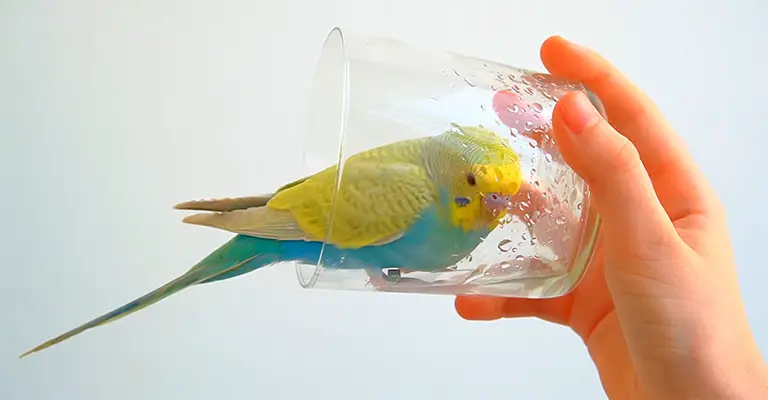
How Often Do Budgies Drink Water and Why?
Budgies, or budgerigars, have specific water consumption patterns influenced by several factors. On average, budgies tend to drink water multiple times a day.
A fresh and clean water source should always be available to them. You may notice your budgie taking short sips intermittently throughout the day.
Their hydration needs are linked to their active metabolism, high body temperature, and diet of primarily dry seeds. Here are the factors affecting drinking frequency:
Environmental Conditions
Budgies tend to drink more water in warmer weather or in drier environments to regulate their body temperature and prevent dehydration.
Diet
The type of diet a budgie consumes can impact its water intake. Birds on a dry seed-based diet may drink more water than those on a diet rich in fresh fruits and vegetables, which naturally contain water.
Activity Level
Active budgies, especially those engaged in flying or playing, may drink water more frequently to replenish fluids lost through physical activity.
Humidity Levels
Budgies may increase their water intake in low-humidity environments to prevent their bodies from becoming too dry. In humid conditions, they might not need to drink as much.
Age
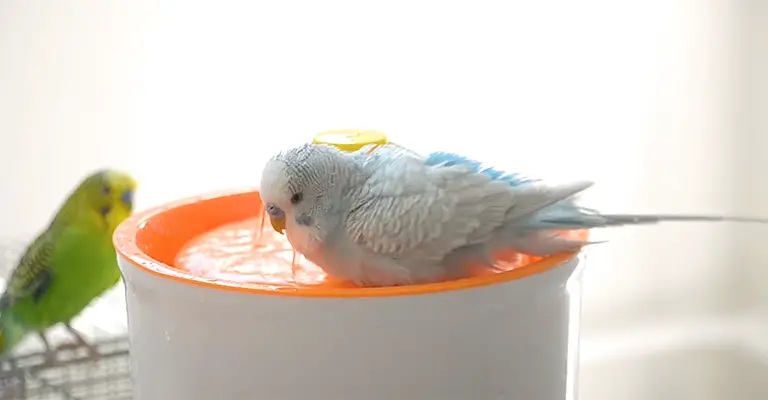
Young budgies and older budgies may have different water intake needs. Juveniles in their growth stages might require more water, while older budgies may have more regulated drinking patterns.
Illness or Stress
Sick or stressed budgies might drink more water as their bodies try to cope with the stress or illness. Increased water intake could also be a sign of an underlying health issue that requires attention.
Dietary Salt Content
High-salt diets can increase a budgie’s thirst. If the bird’s diet contains salty treats or foods, it might drink more water to compensate for the increased salt intake.
Breeding and Nesting
Female budgies may increase their water intake during the breeding season, especially when they are laying eggs or caring for chicks.
Water Dispenser Type
The design of the water dispenser can influence a budgie’s drinking behavior. Some dispensers might encourage more frequent sips due to their design or water flow.
Social Interaction
Budgies are social animals, and their behavior can be influenced by the presence of other birds. If one budgie starts drinking, it might prompt others to drink as well.
Time of Day
Budgies might have varying drinking patterns throughout the day, with more frequent intake during specific periods.
Medication
If a budgie is on medication, it might drink more water to help swallow or process the medication. Always consult a veterinarian before administering any medication to your budgie.
Remember, observing your budgie’s behavior and drinking patterns over time can help you understand its individual needs better. Providing a consistent supply of clean and fresh water is essential regardless of the factors affecting its drinking frequency.
Why Budgies Might Drink Too Much Water?
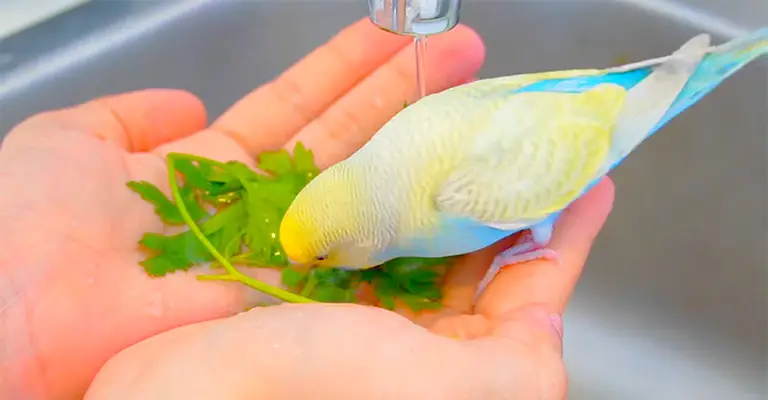
Budgies might drink too much water for several reasons. Here are a few you need to know about:
Heat or Dehydration
In hot environments or when budgies are dehydrated, they might drink excessively to regulate their body temperature and maintain hydration.
Diet
If a budgie’s diet consists of high-sodium or salty foods, it might feel thirstier and drink more water to counteract the effects of excess salt.
Medical Conditions
Certain health issues, such as kidney problems or diabetes, can lead to increased thirst and water consumption in budgies.
Stress or Illness
Stress, anxiety, or underlying illnesses can trigger increased water intake as the body responds to these conditions.
Medication
Some medications might cause increased thirst as a side effect, leading to higher water consumption.
Breeding and Nesting
Female budgies might drink more water when nesting or taking care of chicks due to increased energy demands.
Dietary Changes
A sudden change in diet could result in temporary increased water intake as the budgie’s body adapts to the new nutrients.
If you notice your budgie drinking excessively or showing other unusual behaviors, it’s essential to monitor it closely and consult a veterinarian if the behavior persists or is accompanied by other concerning symptoms.
How Do I Know If My Budgie Is Thirsty?
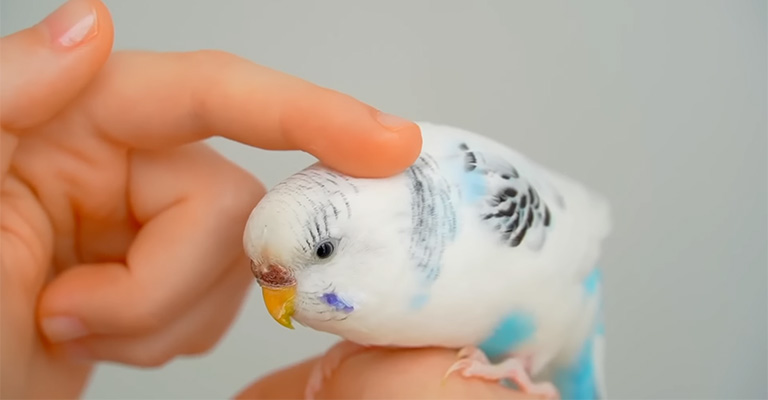
There are a few signs you can watch for to determine if your budgie is thirsty. When your budgie is thirsty, you might notice:
Frequent Sipping
If you observe your budgie frequently sipping water throughout the day, it could be an indication of thirst.
Spending Time Near Water Source
Budgies might spend more time near their water dish or water dispenser if they’re feeling thirsty.
Panting
In warmer conditions, budgies might pant to cool down. Panting can also be a sign of dehydration, prompting them to drink more water.
Eating Wet Foods
If your budgie starts eating fruits, vegetables, or other wet foods more than usual, it might be trying to increase its water intake.
Visibly Dry Beak or Eyes
A budgie that is thirsty might have a slightly dry beak or eyes. However, these signs can also indicate other issues, so it’s essential to consider other factors as well.
Restlessness
If your budgie appears restless or agitated, it might be a sign of discomfort, which could be related to thirst or other health concerns.
Change in Behavior
Unusual behavior, such as increased squawking, flying around frantically, or being unusually quiet, could be your budgie’s way of signaling a problem, including thirst.
Remember that budgies can hide signs of illness or discomfort, so it’s crucial to be attentive to any changes in their behavior or routines.
If you suspect your budgie is thirsty or experiencing any health issues, it’s recommended to consult a veterinarian for proper guidance and care.
Why Is My Budgie Not Drinking Water?
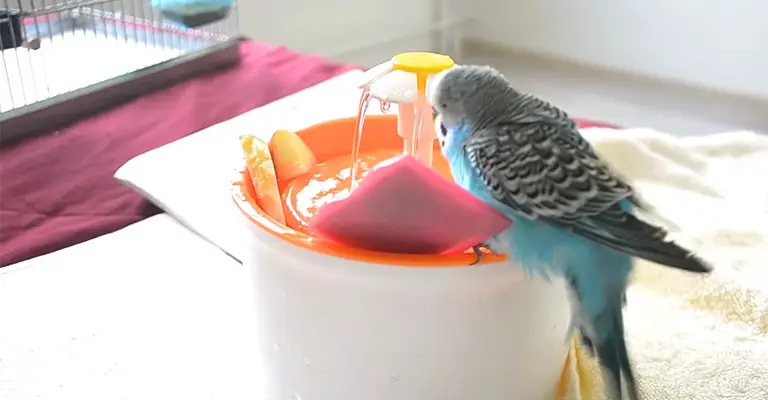
There could be various reasons why your budgie is not drinking water. Here are a few you need to consider:
Environmental Factors
If the ambient temperature and humidity levels are appropriate, your budgie might not feel an urgent need to drink water.
Diet
If your budgie’s diet includes fresh fruits and vegetables with high water content, it might be obtaining sufficient hydration from its food.
New Environment
Budgies can take time to adjust to a new environment, including the location of their water source. Give them some time to become familiar with their surroundings.
Stress
Stressful situations, such as recent changes in the cage setup, new pets, or loud noises, can impact a budgie’s eating and drinking habits.
Illness
Illness can lead to a loss of appetite and reduced water intake. If you notice other signs of illness, such as lethargy, fluffed feathers, or changes in droppings, it’s crucial to consult a vet.
Dirty Water
Budgies are sensitive to the cleanliness of their water. If the water dish is dirty or contaminated, they might avoid drinking from it.
Incorrect Water Dispenser
Some water dispensers might be difficult for budgies to use, or they might not be able to find the water source easily.
Obstructions
Check if there’s anything obstructing the water dispenser or if the water isn’t flowing properly. Certain medications or treatments might affect your budgie’s appetite and water intake.
Dehydration
Ironically, severe dehydration can reduce a budgie’s desire to drink water. If your budgie is not getting enough water, it might become less interested in drinking.
If your budgie continues to show a lack of interest in drinking water, monitor its behavior closely. When you’re concerned, it’s best to consult a veterinarian.
A vet can help identify the underlying cause and provide appropriate guidance to ensure your budgie’s health and well-being.
FAQs
It’s recommended to provide only clean, fresh water to your budgie. Avoid offering other liquids like juice, milk, or sugary drinks, as these can be harmful to their digestive system.
To encourage your budgie to drink water, ensure the water is fresh and clean at all times. You can also offer wet fruits and vegetables, like cucumber or watermelon, to increase their water intake through food.
If your budgie is eating fresh foods with high water content and appears active and healthy, infrequent water drinking might not be a concern. However, if you notice any signs of illness or unusual behavior, consult a vet.
Change the water daily and clean the water dish regularly to prevent contamination. Place the water dish away from the cage’s perches to minimize droppings getting into the water.
Signs of dehydration include lethargy, dry beak, and sunken eyes. If you suspect dehydration, consult a vet immediately. The vet can provide proper treatment and hydration to address the issue.
Conclusion
The water consumption patterns of budgies are influenced by a delicate interplay of instinctual behavior, physiological requirements, and environmental factors.
These charming birds have evolved to be efficient in managing their hydration needs, which is evident in their ability to adjust their water intake based on external conditions.
By observing and understanding their drinking habits, caregivers can better ensure the well-being of their pet budgies. Providing clean and fresh water at all times, along with considering factors like temperature, diet, and activity level, contributes to a thriving avian companion.
As responsible pet owners, it’s essential to recognize what individual budgies might exhibit. Regular monitoring and adaptation to their preferences can lead to a stronger bond and a healthier, happier budgie.
By combining our knowledge of budgie behavior with their specific hydration requirements, we can create an environment that supports their natural instincts and physiological needs.